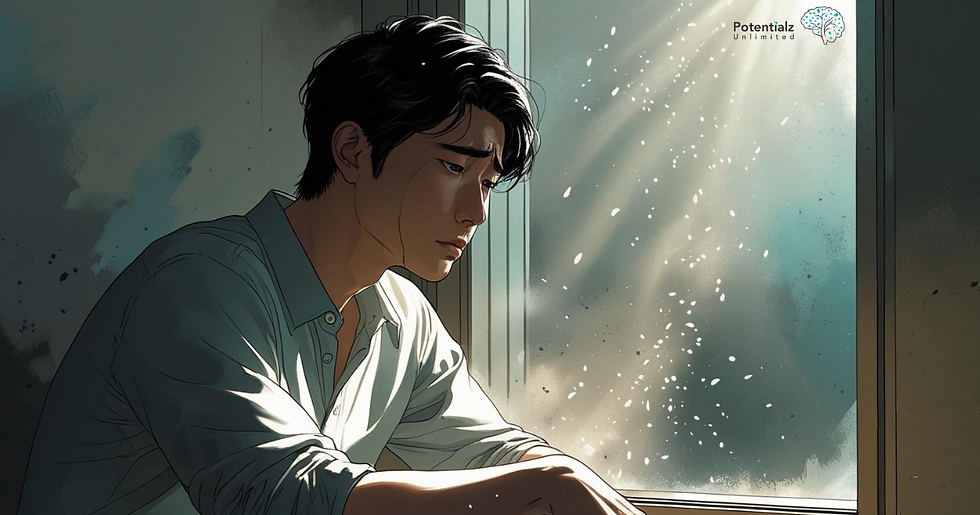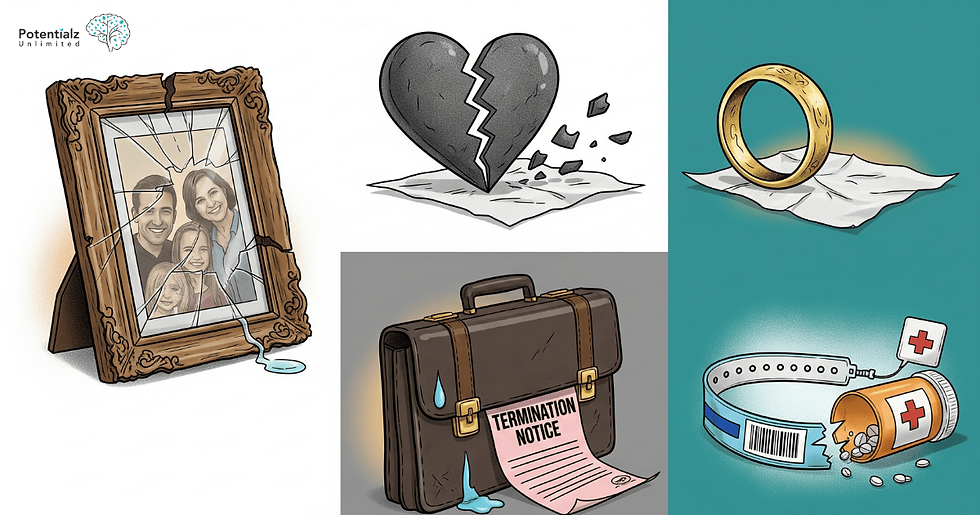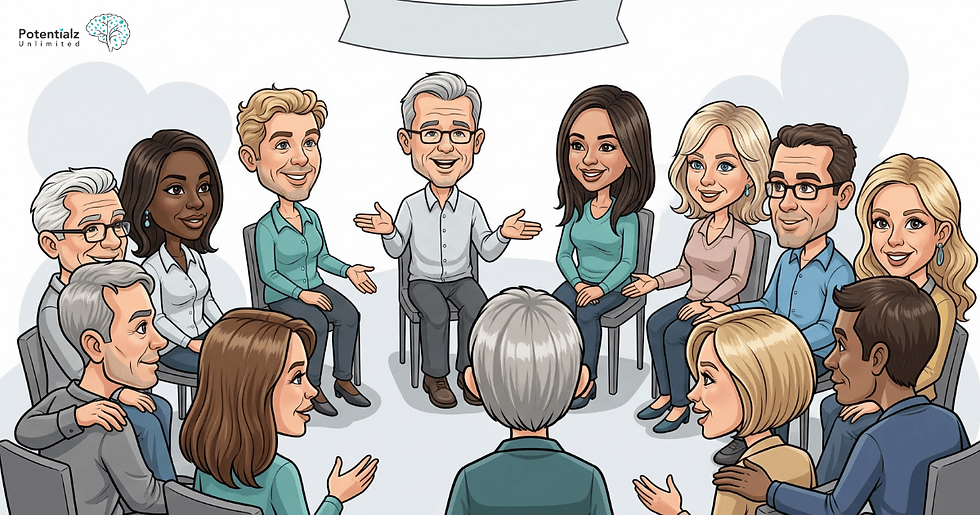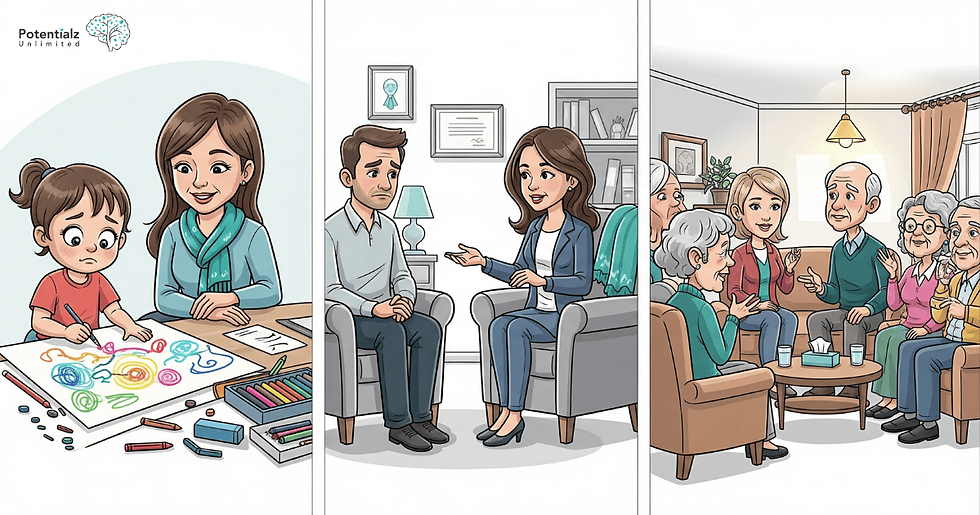Grief and Loss Counseling - How Therapy Can Help You Deal With the Emotion
- Gurprit Ganda

- Jun 7, 2024
- 10 min read
Updated: Aug 6, 2025
Bottom line up front: Grief and loss counseling offers evidence-based support that helps you process difficult emotions, develop healthy coping strategies, and find meaning after significant losses. Research shows specialized grief therapy can be 2-3 times more effective than general therapy, with 67% of people experiencing significant improvement in their ability to function and find hope again.

Understanding Grief: A Natural Yet Complex Journey
Grief is one of life's most universal yet deeply personal experiences. Whether you're facing the death of a loved one, divorce, job loss, or any significant life change, grief touches everyone differently. While sadness after loss is completely normal, some people find themselves stuck in intense pain that doesn't seem to improve over time.
In Australia alone, about 1 to 1.5 million persons are newly bereaved each year, and while most people naturally adapt to loss, complicated grief affects between 2% to 3% of the population worldwide and 7% to 10% of bereaved people. This means millions of people could benefit from professional grief support.
Think of grief like a deep wound. Just as some physical injuries heal naturally while others need medical attention, emotional wounds from loss sometimes require professional care to heal properly.

When Normal Grief Becomes Complicated
Most people experience what we call "normal grief" – intense sadness, anger, confusion, and other difficult emotions that gradually soften over time. However, some individuals develop what mental health professionals call "complicated grief" or "prolonged grief disorder."
Signs You Might Benefit from Grief Counseling
Intense grief lasting longer than expected (typically 6-12 months without improvement)
Avoiding reminders of your loss or the person who died
Feeling stuck in anger, guilt, or blame about the death or loss
Inability to accept the reality of the loss
Loss of meaning or purpose in life
Extreme difficulty trusting others or forming new relationships
Persistent longing that interferes with daily activities

Prolonged grief disorder is characterized by intense and persistent grief that causes problems and interferes with daily life. The good news? Professional help is available and highly effective.
The Science Behind Grief and Loss Counseling
Evidence-Based Approaches That Work
Recent research has identified several highly effective therapeutic approaches for grief and loss:
Complicated Grief Therapy (CGT) is considered the gold standard treatment. CGT has been demonstrated to be effective in a trial where individuals receiving CGT responded more quickly and were more likely to respond overall (51% vs 28%) compared to other treatments.
Cognitive Behavioral Therapy for Grief focuses on helping you understand the connection between thoughts, feelings, and behaviors related to your loss. CBTgrief is found to be a feasible and acceptable therapy for bereaved individuals and shows promising results in research trials.
EMDR for Grief uses bilateral stimulation to help process traumatic grief memories. EMDR is a fitting treatment option for those with Prolonged Grief, focusing on processing past memories, blocks, current triggers, future fears.
How Grief Therapy Differs from General Counseling
Grief counseling uses specialized techniques designed specifically for loss-related challenges:
Narrative therapy helps you tell your story and find new meaning
Exposure techniques gradually help you face avoided situations or memories
Behavioral activation encourages engagement in meaningful activities
Attachment-focused work addresses how loss affects your ability to connect with others

Types of Loss That Benefit from Professional Support
Death of a Loved One
The most recognized form of grief, whether sudden or anticipated. Professional support helps you:
Process the reality of death
Work through guilt or regret
Learn to maintain connection while letting go
Navigate special occasions and anniversaries
Relationship Losses
Divorce, breakups, or estrangement from family members create unique grief patterns:
Processing feelings of rejection or abandonment
Dealing with ongoing contact (especially with children involved)
Rebuilding identity as a single person
Managing shared social circles
Job Loss and Career Changes
Professional identity loss can trigger significant grief:
Coping with financial stress and uncertainty
Processing feelings of failure or inadequacy
Exploring new career directions
Maintaining self-worth during job searches
Health-Related Losses
Chronic illness, disability, or loss of physical abilities bring their own grief challenges:
Accepting changed physical capabilities
Adjusting life goals and expectations
Managing ongoing medical treatment
Finding new sources of meaning and purpose

What to Expect in Grief and Loss Counseling
Initial Assessment and Goal Setting
Your therapist will help you understand your specific grief pattern and establish realistic goals. This might include:
Exploring your relationship with the person or situation you've lost
Identifying stuck points in your grief process
Understanding how loss has affected your daily functioning
Setting therapy goals that matter to you
Core Treatment Phases
Phase 1: Safety and Stabilization
Learning emotional regulation skills
Developing healthy coping strategies
Building support systems
Addressing immediate safety concerns
Phase 2: Processing and Integration
Gradually facing avoided memories or situations
Working through difficult emotions like guilt, anger, or regret
Telling your story in a safe, supportive environment
Challenging unhelpful beliefs about the loss
Phase 3: Restoration and Moving Forward
Reconnecting with meaningful activities and relationships
Finding new sources of purpose and joy
Planning for challenging times (anniversaries, holidays)
Developing a continuing bond with what you've lost

Specialized Grief Counseling Techniques
Narrative Therapy for Grief
This approach helps you re-author your life story after loss:
Separating your identity from the grief experience
Identifying unique outcomes and strengths
Exploring preferred stories about your relationship with the deceased
Developing new life narratives that include both loss and hope
Continuing Bonds Work
Modern grief therapy recognizes that healthy grieving doesn't mean "letting go" completely:
Finding appropriate ways to maintain connection
Creating meaningful rituals or memorials
Writing letters or journaling to your loved one
Carrying forward their values and lessons
Group Grief Counseling
Bereavement support groups can also provide a useful source of social connection and support. They can help people feel less alone and offer unique benefits:
Connecting with others who understand your experience
Learning from different coping strategies
Reducing isolation and shame
Providing mutual support and encouragement

Cultural Considerations in Grief Counseling
The norms of a person's culture influence grief expression, mourning rituals, and perspectives on death. Effective grief counseling respects and incorporates your cultural background:
Different Cultural Expressions of Grief
Collectivist cultures may emphasize family and community support
Religious traditions often provide specific rituals and beliefs about death
Gender roles may influence how grief is expressed and supported
Generational differences affect attitudes toward seeking professional help
Culturally Responsive Treatment
Quality grief counseling adapts to your specific needs:
Understanding your cultural beliefs about death and afterlife
Incorporating traditional healing practices when appropriate
Respecting family dynamics and decision-making processes
Addressing language barriers and communication styles

Grief Counseling for Different Age Groups
Children and Adolescent Grief Counseling
Young people process loss differently than adults and need age-appropriate support:
Using play therapy and creative expression
Helping them understand death and loss concepts
Supporting them through developmental changes
Working with families to create supportive environments
Research also suggests that CBT can be effective with children and adolescents experiencing symptoms of prolonged grief.
Adult Grief Counseling
Adult-focused approaches address:
Complex relationship dynamics
Financial and practical concerns
Parenting responsibilities while grieving
Career and life planning adjustments
Older Adult Grief Support
Seniors face unique grief challenges:
Multiple losses within short timeframes
Health concerns that complicate grieving
Social isolation and reduced support systems
Reflection on their own mortality

The Role of Family in Grief Counseling
Family Systems Approach
Grief affects entire family systems, not just individuals:
Understanding how family members grieve differently
Improving communication about loss and pain
Addressing conflicts that arise during grief
Strengthening family bonds through shared healing
Supporting Family Members
Professional grief counseling can help families:
Learn about different grief styles and timelines
Develop patience and understanding for each other
Create new family traditions that honor their loss
Navigate special occasions and anniversaries together

Overcoming Common Barriers to Seeking Grief Counseling
"I Should Be Able to Handle This Alone"
Many people resist seeking help because they believe grief is something they should manage independently. However:
Seeking support shows strength, not weakness
Professional guidance can prevent complicated grief from developing
You deserve care during one of life's most difficult experiences
Getting help can actually speed up your natural healing process
"It's Been Too Long" or "It Hasn't Been Long Enough"
There's no "right" timeline for seeking grief support:
Some people benefit from immediate support after loss
Others find help years later when they realize they're still stuck
Treatment interventions can effectively diminish complicated grief symptoms regardless of when you start
"Talking Won't Bring Them Back"
While grief counseling can't change your loss, it can:
Help you find meaning and purpose despite the loss
Reduce the intensity of painful emotions
Improve your daily functioning and relationships
Honor your loved one through healthy healing

Building Resilience Through Grief Counseling
Developing Emotional Resilience
Grief counseling teaches skills that serve you beyond your current loss:
Emotional regulation techniques for managing intense feelings
Stress management strategies for difficult times
Communication skills for expressing needs and boundaries
Problem-solving abilities for life challenges
Post-Traumatic Growth
Many people discover that working through grief leads to unexpected growth:
Deeper appreciation for life and relationships
Increased empathy and compassion for others
Stronger spiritual or philosophical beliefs
Greater personal strength and confidence
Creating Meaning from Loss
Professional support helps you find purpose in your pain:
Volunteering or advocacy related to your loss
Supporting others facing similar challenges
Pursuing new goals inspired by your loved one
Living according to values clarified through loss

Practical Steps to Begin Grief Counseling
Finding the Right Grief Counselor
Look for professionals with:
Specialized training in grief and loss therapy
Experience with your type of loss
Cultural competence relevant to your background
Approaches that feel comfortable to you
What to Ask Potential Counselors
"What is your experience with grief and loss counseling?"
"What therapeutic approaches do you use for grief?"
"How do you measure progress in grief therapy?"
"What is your philosophy about the grief process?"
Preparing for Your First Session
Write down your main concerns and goals
Gather any relevant information about your loss
Prepare to discuss your support system
Come with an open mind and be patient with the process

Self-Care During Grief Counseling
Supporting Your Therapy Work
Attend sessions regularly and arrive prepared
Practice techniques between sessions
Keep a grief journal to track thoughts and feelings
Be honest about what's working and what isn't
Maintaining Physical Health
Grief affects your whole person, so take care of:
Sleep: Maintain regular sleep schedules despite emotional turmoil
Nutrition: Eat regularly even when appetite is poor
Exercise: Gentle movement helps process emotions and stress
Medical care: Don't neglect regular health checkups
Building Your Support Network
Stay connected with understanding friends and family
Consider joining grief support groups
Engage with spiritual or religious communities
Limit time with people who don't support your healing

Success Stories: Real Examples of Healing
Sarah's Journey Through Spousal Loss
Sarah lost her husband of 30 years to cancer. Initially, she couldn't imagine life without him and avoided their shared spaces and activities. Through CGT, she learned to:
Process her guilt about moments of relief during his illness
Gradually re-engage with places and people they'd shared
Develop new routines that honored their relationship while building independence
Find meaning through volunteering with other cancer families
Marcus's Path After Divorce
Marcus struggled with intense anger and feelings of failure after his divorce. Grief counseling helped him:
Understand divorce as a legitimate form of loss requiring mourning
Work through anger in healthy ways that didn't hurt his co-parenting relationship
Rebuild his identity as a single person and father
Create new traditions and goals for his future
The Chen Family's Healing After Teen Loss
When the Chen family lost their 16-year-old son in an accident, each family member grieved differently, creating conflict and isolation. Family grief counseling helped them:
Understand and respect each other's grief styles
Communicate about their pain without blame
Create meaningful rituals to honor their son's memory
Support each other through difficult anniversaries and milestones

Technology and Modern Grief Support
Online Grief Counseling Options
Internet- and mobile-based interventions against symptoms of grief after bereavement have shown effectiveness for many people:
Convenient access from home
Flexibility for varying energy levels
Options for those in remote locations
Combination with in-person sessions when needed
Digital Support Tools
Grief tracking apps for monitoring moods and progress
Online memorial platforms for maintaining connections
Virtual support group participation
Meditation and mindfulness apps for emotional regulation

The Long-Term Journey: Life After Grief Counseling
Continuing Your Healing Journey
Grief counseling provides tools for lifelong resilience:
Recognizing when you might need additional support
Using learned skills during future losses
Helping others who face similar challenges
Maintaining healthy relationships and self-care practices
Honoring Your Growth
As you heal, it's important to:
Acknowledge how far you've come
Celebrate small victories and progress
Share your story to help others when appropriate
Continue pursuing meaningful activities and relationships
When Grief Resurfaces
Grief can return during:
Anniversaries and special dates
Major life transitions
Additional losses
Stressful life periods
This is normal and doesn't mean you've failed. The skills you've learned will help you navigate these challenging times.

Test Your Knowledge
Conclusion: Hope for Healing
Grief and loss are among life's most challenging experiences, but you don't have to face them alone. Professional grief counseling offers evidence-based support that can help you process difficult emotions, develop healthy coping strategies, and find meaning after significant losses.
CGT has been demonstrated to be effective and treatment interventions can effectively diminish complicated grief symptoms. The research is clear: specialized grief therapy works, and it can help you move from surviving your loss to eventually thriving again.
Remember that seeking help is not a sign of weakness – it's a courageous step toward healing. Your grief is unique, your timeline is your own, and your loved one's memory can be honored through your healing journey.
Whether you're facing recent loss or struggling with grief that feels stuck, professional support is available. Take that first step toward healing. You deserve to experience hope, joy, and meaning again, even after significant loss.
Your journey through grief doesn't have to end in perpetual sadness. With the right support, skills, and time, you can create a life that honors both your loss and your capacity for continued growth and love.

Related Links:




Comments